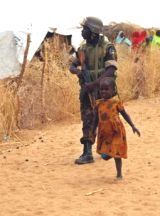UN hears pleas for protection force, and calls for Jihad in Darfur
June 9, 2006 (AL-FASHER) — A UN Security Council delegation came face to face with the reality in Sudan’s war-torn Darfur region, hearing pleas for a force to protect civilians and also calls for jihad if such a force is deployed.
 In Al Fasher, the main town in north Darfur, the diplomats were told by UN and NGO staffers on the ground that the situation in refugee camps and in the region generally was worsening for political reasons.
In Al Fasher, the main town in north Darfur, the diplomats were told by UN and NGO staffers on the ground that the situation in refugee camps and in the region generally was worsening for political reasons.
Cate Steaims, head of the local office of the UN Advance Mission to Sudan (UNAMIS), said the Abu Shouk and Zam Zam camps near Al Fasher had been the scene of recent protests, some violent, against the Darfur peace accord signed on May 5 in the Nigerian capital Abuja between the Sudanese government and a main rebel group.
The 15-strong Security Council delegation was unable to visit Abu Shouk because of security fears.
At the beginning of May, during a visit to the camp by the UN’s humanitarian assistance coordinator Jan Egeland, a man was hacked to death for reasons that remain unclear. Egeland’s group was forced to make a hasty exit.
Steaims said the situation there had become less secure because of political and ethnic differences between two Sudanese Liberation Movement (SLM) factions — that of Abdulwahid al-Nur, which did not sign the accord, and that of Minni Minawi, which had initialled it.
She said relations between the two groups were getting worse and that violent acts had been committed outside the camps.
“Very very brutal. Women were raped,” Steaims said.
“The final message is: please, if we have a UN force, make it strong enough, give it a robust peacekeeping mandate so that it is able to protect civilians,” she told the delegation during a public meeting at the UNAMIS offices in Al Fasher.
The Security Council hopes the current African Union (AU) force in Darfur will pass the baton to stronger and better-equipped UN peacekeepers to police the Abuja accord.
The 7,000-strong AU force is overstretched as it tries to pacify a region as large as France.
The idea of a UN peacekeeping force, proposed by the African Union itself, has come up against opposition from the Sudanese government and from those who believe it to be a Western attempt to recolonise the country.
“If a UN force is sent here, I will call for jihad,” Muwad Jalalabin, a chief of the Barty tribe, told journalists.
He said he represents 70 percent of the population of north Darfur.
Jalalabin said his people would consider as “foreign occupation” any UN attempt to deploy a force that was not 100 percent African, and he would be obliged to call for jihad.
The governor of north Darfur, Osman Mohamed Yussef Kebir, later told the delegation head, Britain’s UN ambassador Emyr Jones Parry: “There are discussions with the Sudanese government, and we have to wait for its decision.”
On Tuesday Khartoum reserved its response to calls by the UN delegation to give the green light to UN peacekeepers in Darfur, saying it would await the results of the joint UN-AU mission on the needs of such a force.
The UN-AU mission is expected in Darfur in the coming days. It will be led by Jean-Marie Guehenno, head of the UN’s peacekeeping division.
(ST)
